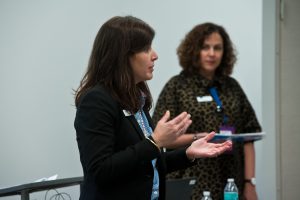Managing a Diverse Workforce in a Changing City


Recruiting a diverse workforce often means developing a more diverse recruitment playbook—one with strategies that can differ from block to block if necessary, so the message can be calibrated to the audience.
That’s one of the lessons that Chicago’s human-resources commissioner, Soo Choi, says she’s learned during an eight-year career leading the department. Choi’s remarks this week at the From Day One conference in Chicago had a reflective tone, which is fitting as the city approaches a turning point. There’s a mayoral runoff election in April, and two-term incumbent Rahm Emanuel isn’t on the ballot. That gave Choi, who was named commissioner of Chicago’s HR department shortly after Emanuel’s election in 2011, an opportunity to take stock of her department’s progress. She focused on her efforts to improve equity and diversity in the city’s hiring practices.
Diversity “is the city’s passion,” Choi said. It’s “definitely our strong belief that our workforce should reflect the demographics of the city.”
Choi, an attorney, came to the job after spending five years monitoring city hiring practices on behalf of Chicago’s Office of Inspector General. City hiring practices had been under federal oversight since the early 1970s, owing to a history of jobs handed as rewards for political patronage. One of Choi’s signature accomplishments as HR commissioner came in 2014, when the city was finally released from that oversight. However, last week Chicago's troubled police department went under federal oversight while it undergoes a reform process.

At the From Day One conference, where Choi was interviewed by Lorraine Conroy, director of the University of Illinois at Chicago’s Center for Healthy Work, Choi focused on another of her most substantial challenges: recruiting and managing a diverse city workforce. She has found that successful recruitment of African-American and Latino candidates depends on tailored messaging that sometimes needs to varied by neighborhood.
For example, during a push to hire minority police officers, Choi’s team determined “that in some neighborhoods, people really took the advice of their churches; in other places, maybe it was the gym or the barbershop. We really looked at it in granular detail to figure out, with the resources we had, how to communicate with people to tell them about the opportunity, get them excited about applying, and encourage them to participate,” she said. “I'm really proud of those efforts because they really made a large difference.”
Recently, Choi has aimed to apply the same playbook to a similar challenge: the city’s difficulty in attracting and hiring Latinos, despite that group’s growing share of the city’s overall population. Latinos represent about one third of the city's 2.7 million residents, but reportedly hold only 15% to 17% of the city's 35,000 municipal jobs.
A dearth of applicants “tells us that we are losing something in the communication,” says Choi. In response, she’s begun partnering with career-development organizations focused on the Latino community, as well as with the City Council’s Latino Caucus.
“We’re working with them closely to figure out what are we doing here that isn't quite making the mark,” said Choi. “Those kinds of initiatives, I hope, will produce better results.”
Last Spring, Choi hired Marquis Miller as the city’s first-ever chief diversity officer. She said Miller has been useful in fine-tuning the city’s hiring processes as well as in reviewing the policies and work environments of differing city departments to make them more friendly to workers from diverse backgrounds.
“We wanted to engage departments to really think about what kind of workplace cultures they actually have,” Choi said.
Having those conversations throughout an organization as large and diverse as the City of Chicago was “a monumental challenge,” Choi said—but it’s one she says has been worthwhile.
One of the new elements introduced with Miller was a pilot program used for testing proposed policy or procedural changes. The city now tests its changes on five or six departments. “That way we can kind of see how effective they are before we do larger-scale change,” said Choi.
A related initiative is making sure that city employees at all levels feel empowered to share their feedback—including their frustrations—with Choi’s team. She said she has begun to share more employee complaints with department managers, and also prioritized follow-up to see how those team leaders responded.
Even when employee complaints don’t qualify as policy violations, “often they clearly tell us there's something going on. So we decided to start using that information to communicate with department heads and say, ‘Look, you know, we really think you need to take a closer look at this particular division because we're seeing complaints that at least show us that people are not happy,’” said Choi.

Choi’s goal, then, is a city workforce that is hired equitably and reflects the city’s diversity, and also that finds their workplace to be one in which workers feel valued and accepted. That’s not easy in a city as large as Chicago, but as Emanuel’s tenure as mayor approaches its end, Choi believes she has made important progress.
Breakout sessions: Earlier in the day at the From Day One conference, J Zac Stein, chief operating officer of Lattice, led a workshop on the often-uncomfortable art of giving feedback to employees; Melissa Anderson, co-founder and president of Public Good, spoke about the power of inspiring people to take social action alongside a corporate brand; and Julie Caldwell and Ashley Oster of E4E Relief told how their organization helps companies support their employees in need and build good will in their communities by administering charitable grants and managing employee-relief programs.
Steve Hendershot is a multimedia journalist in Chicago. He writes about technology and entrepreneurship for Crain’s Chicago Business, and also is the author of a bestselling book about the videogame series Street Fighter. Follow him on Twitter at @stevehendershot
The From Day One Newsletter is a monthly roundup of articles, features, and editorials on innovative ways for companies to forge stronger relationships with their employees, customers, and communities.